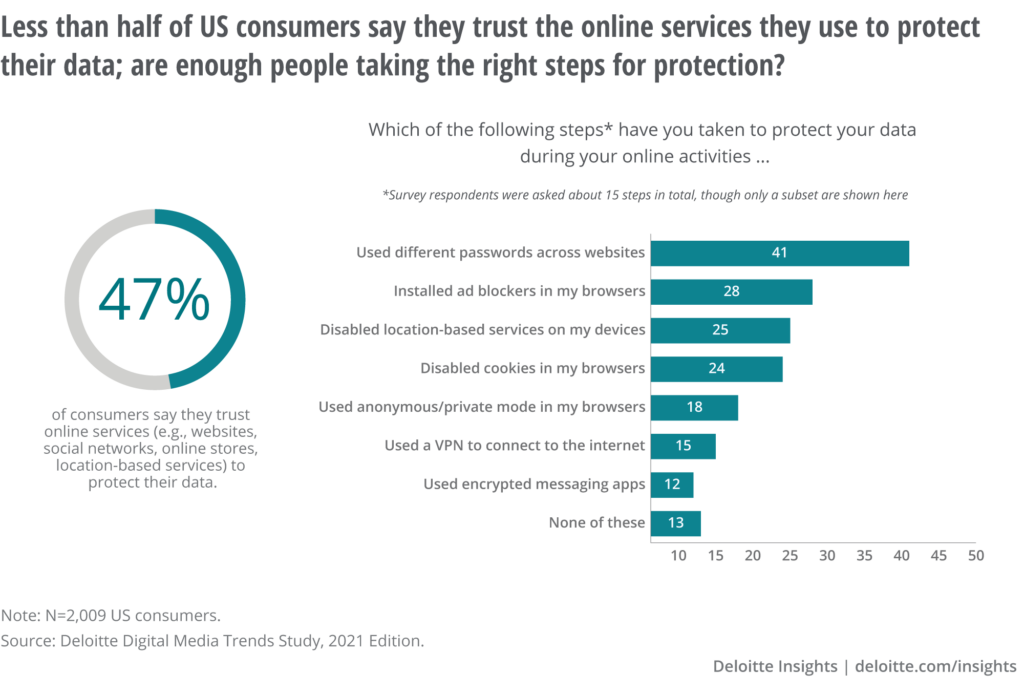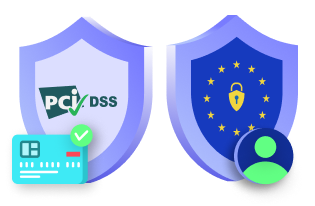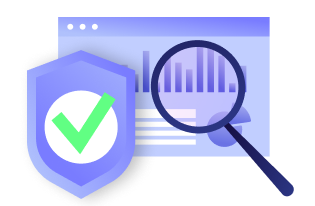Numbers don’t lie. Online privacy has always been under attack, but in an era where digital footprints are deeper than ever, it has become a pivotal issue demanding our undivided attention. Get ready to be astonished as we unveil eye-opening data privacy statistics.
Top 13 data privacy statistics
48% of respondents feel they have no control over the search terms they use
Source: Statista
Nearly half of US adults are concerned about their online searches. In addition to that, they stated that they felt no control over personal information such as websites visited, online purchases, private conversations online, etc.

57% of global internet users find it impossible to completely protect their privacy in 2022
Source: Statista
Privacy concerns are on the rise. According to Statista’s global 2022 study, more than half of netizens don’t believe they can keep their online activities private.
On top of that, 63% would accept certain privacy risks to make their life more convenient. For example, three in four respondents from New Zealand prefer comfort and convenience over privacy matters.
41.4% of all websites use cookies
Source: W3Techs
Cookies are one of the most popular tools used by websites and advertisers to track online activities.
Out of them, non-secure and non-HttpOnly cookies are the most prevalent, both at 75.2%. Furthermore, session cookies (69.9%) are more common than persistent ones (55.9%).
More than 50% of small businesses don’t have any cybersecurity measures in place
Source: Digital.com
In March 2022, over half of small businesses (51%) lacked cybersecurity measures. One-fifth were developing plans, and 30% had no protection.
Of those without measures, 59% believed their business was too small to be targeted, and 36% had no concerns. One in five online small businesses experienced a cyberattack.
In 2022, 70% of global internet users have taken steps to protect their online activities
Source: Statista
As of December 2022, seven in ten respondents have taken steps to safeguard their identity online. Given the worrying digital footprint statistics, this comes as no surprise.
The most popular form of protection was parental control, at 36%.
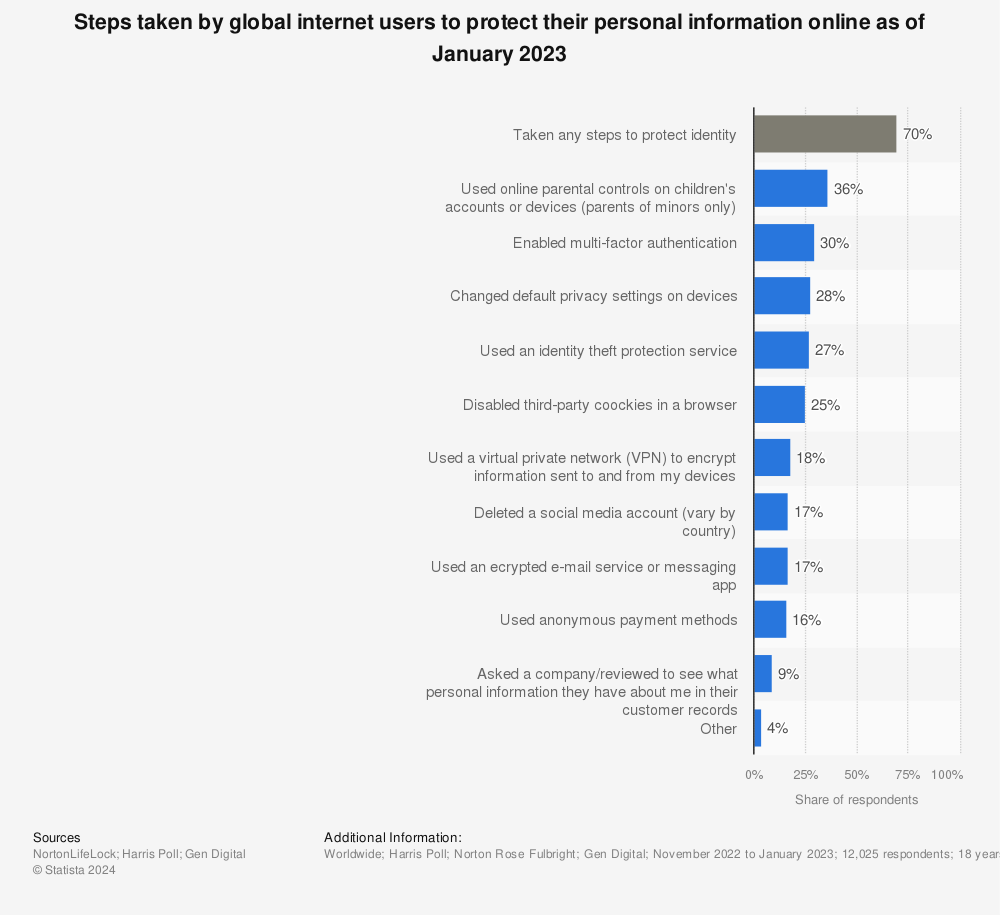
Out of all social media, Facebook collects the most data about you
Source: Clario
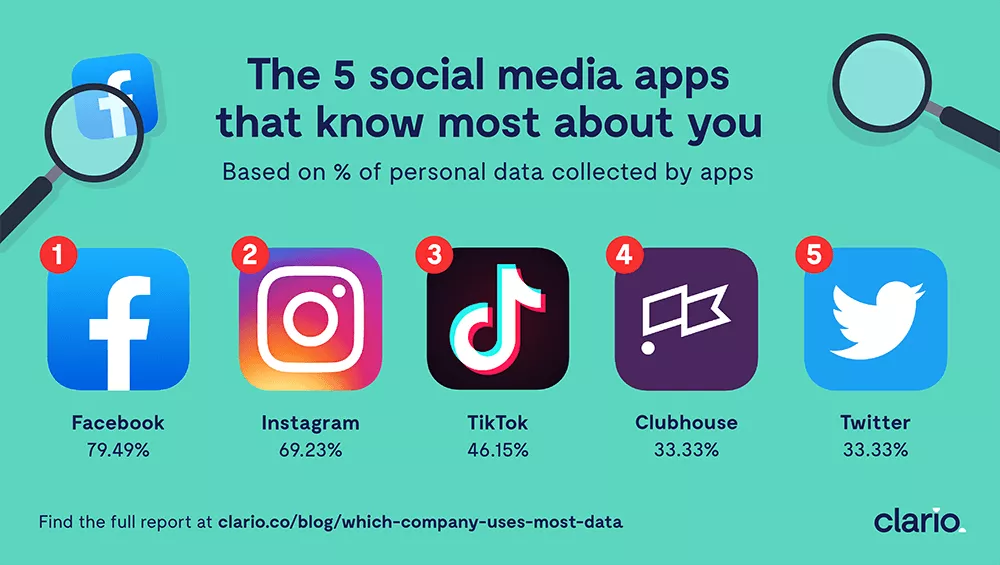
As per this 2022 report, Facebook is the most data-hungry platform. It collects 79.49% of personal information, like your hobbies, pets, favorite shows, and more.
Instagram is next on the list, with 69.23%. TikTok is in third place, at 46.15%. Finally, Clubhouse and Twitter are evenly matched with 33.33%.
50% of US consumers trust social media and other online services to protect personal data
Source: Deloitte
The same study shows that 41% have used different passwords across websites as their dominant security measure, followed by ad blockers.
77% of US adults are aware of data collection via ads
Source: Pew Research
As per Pew Research’s data privacy statistics, about 77% of US adults know that companies collect information about their online browsing to create profiles. And out of those people, around 75% think that almost all businesses use this method.
92% of consumers don’t trust shopping recommendations from chats or pop-ups
Source: Chain Store Age
It’s becoming increasingly difficult to influence consumers with technology. A whopping 92% steer clear of pop-ups and chats when it comes to shopping recommendations.
In addition to that, 81% don’t trust ads on mobile devices. Only 23% of consumers think that social media ads are reliable.
The global average cost of a data breach is $4.35 million
Source: IBM
Data breaches can be an expensive mistake. According to IBM’s 2022 report, the US is in first place with the highest average cost of a data breach at $9.44 million, whereas the global average is $4.35 million.
25% of Americans are asked almost daily to agree to a privacy policy
Source: Pew Research
One-quarter of adult Americans say they are asked to agree to a privacy policy almost every day, while 32% say this happens about once a week. However, only 22% thoroughly read the policy before agreeing to the terms and conditions.
83% of netizens worldwide want to take more action for online privacy protection in 2022
Source: Statista
Internet users are becoming increasingly proactive in privacy matters. Australian netizens are in the lead with 89%. They are closely followed by New Zealand with 88% and the US with 86%.
79% of Americans lack confidence in companies admitting to misusing and compromising their data
Most Americans don’t believe that companies will admit mistakes and take responsibility for data misuse. Furthermore, 69% don’t trust companies to use their data in ways that they will be comfortable with.
In light of these stats…
Netizens and consumers are becoming increasingly aware of the pervasive internet privacy issues. As a result, companies and organizations are under pressure to regain their trust.
These data privacy statistics indicate that a gap is slowly widening between them. Furthermore, more users are taking initial steps to minimize their digital footprint and protect their information. However, implementing robust security measures and maintaining a transparent privacy policy will always inspire confidence.
Frequently asked questions
Why is online privacy important?
Online privacy is important because user data is a valuable asset. Even information that one may find trivial is useful to companies and cybercriminals. It can be used against users or sold for profit, so it’s essential to keep user data safe.
For companies, safeguarding customer data not only builds trust and loyalty but also minimizes the risk of legal consequences. Furthermore, ensuring robust privacy measures helps companies comply with regulatory requirements and avoid costly data breaches. By prioritizing online privacy, they can foster a secure and trustworthy environment.
What is data privacy?
Data privacy means that individuals have the right to control and protect their personal information, especially on the Internet. It includes aspects such as how their data is collected, stored, and used by organizations and governments. Data privacy ensures that individuals have the ability to determine what information is collected about them, how it is collected, how it is used, and who has access to it. It also entails that individuals should be informed about how their data is being handled and the reasons for its usage. Data privacy is significant as it helps prevent unauthorized intrusion into individuals’ privacy, inappropriate use of their information, and potential harm resulting from the misuse of their data.
How can we protect online privacy?
There are several ways one can protect online privacy. If you are a user who has shared a lot of data online, you can implement the following measures:
- Creating strong passwords
- Refraining from oversharing on social media
- Using a password manager
- Enabling multi-factor authentication
- Adjusting your privacy settings on apps
- Installing a VPN.
Companies can protect user privacy by following these practices:
- Implementing robust data security measures
- Regularly updating privacy policies
- Training employees on privacy best practices
- Conducting privacy impact assessments and security audits
- Adhering to privacy regulations and guidelines
- Encrypting sensitive data
- Implementing strict access controls and user permissions
- Ensuring third-party vendors follow necessary security and privacy protocols
- Establishing transparency in all their business practices
Author bio: Milos Djordjevic is an online privacy expert at VPNCentral, specializing in helping organizations and individuals navigate the complexities of the digital world and ensuring their security.
Disclaimer: This article is for general informational purposes only and should not be taken as legal or professional advice. The views and opinions expressed in this article are solely those of the author and do not necessarily reflect the views of our organization. We do not endorse any products or services mentioned in the article.

